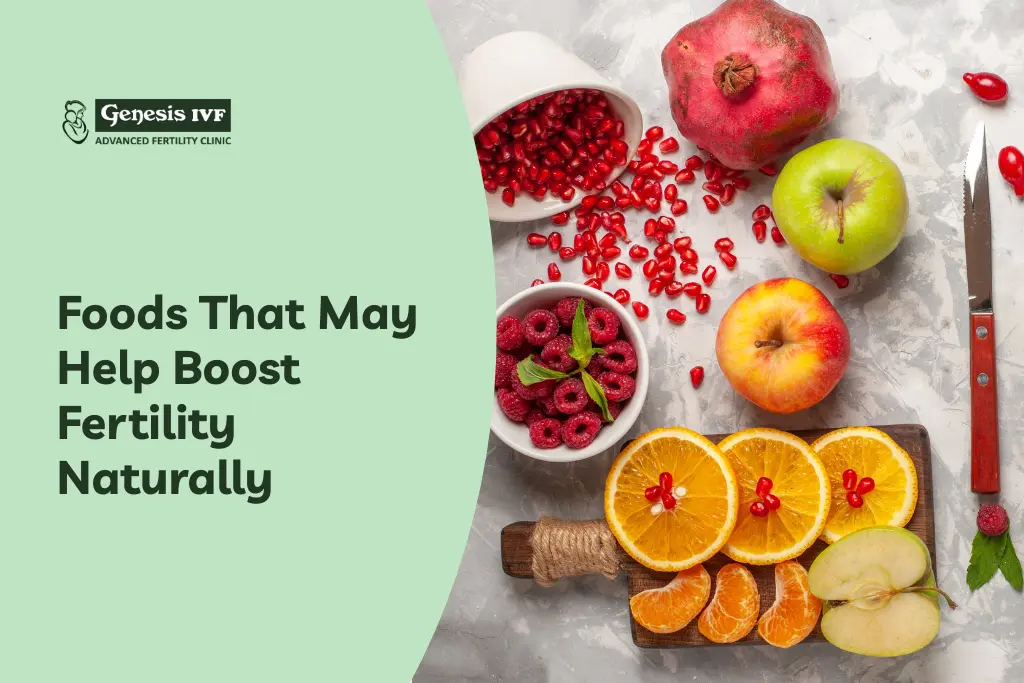When trying to conceive, medical intervention is highlighted by most couples, but the least attended to factor is diet. What you eat plays a critical role in hormone production, sperm and egg quality, and reproductive health overall. At Genesis IVF Fertility Centre, we believe that combining medical acumen with mindful eating can strengthen your journey to parenthood. Gaining knowledge about how nutrients affect your body will help naturally with fertility and increase the chances of conception.
Fertility starts from within. A mindful diet can naturally enhance egg and sperm quality and improve your chances of conceiving.
Why Diet Matters for Fertility
Your reproductive system is very sensitive to dietary imbalance. Nutrition regulates hormones, protects eggs and sperm from oxidative stress, and affects ovulation and implantation. For women, a balanced diet can provide regular cycles and healthy eggs. For men, it can increase sperm count and motility. No food can guarantee pregnancy, but certain eating habits have been found to make the body fertile.
Whole Grains to Promote Hormone Balance
Refined carbohydrates such as white bread and sweet snack foods promote insulin resistance, which disturbs ovulation. Whole grains such as brown rice, quinoa, oats, and barley are rich in fiber and complex carbohydrates that have stable blood sugar and stable hormone balance. In women with polycystic ovarian syndrome, a common cause of infertility, an eating regimen low in refined carbohydrates and high in whole grains is very beneficial.
Fruits and Vegetables for Antioxidants
Colored fruits and vegetables are rich in antioxidants, which protect eggs and sperm from oxidative stress. Berries, spinach, kale, bell peppers, and carrots are especially rich in vitamin C, beta carotene, and folate. These compounds support cell health, egg formation, and embryo growth. A plant-rich diet also provides iron and other minerals needed for reproduction.
Healthy Fats for Hormone Production
Fats are required for the production of hormones like estrogen and progesterone. Not all fats are created equal, however. Omega-3 fatty acids found in walnuts, flaxseeds, chia seeds, and oily fish like salmon and sardines fight inflammation and promote a healthy reproductive tract. Avoid trans fats found in fried foods and processed food products since they interfere with ovulation.
Lean Protein Sources to Enhance Egg and Sperm Health
Replacing some animal proteins with plant alternatives fosters fertility. Beans, lentils, tofu, seeds, and nuts provide protein as well as dietary fiber and nutrients. For non-vegetarians, lean meats, poultry, and eggs are sources of good-quality protein that contain no saturated fats to disrupt hormonal balance. Studies have shown that women who consume higher amounts of plant protein and fewer processed foods have better ovulatory function.
Full-Fat Dairy in Moderation
There is some research that indicates full-fat milk foods like yogurt and whole milk may be more fertility-friendly than low-fat versions. This maybe because full-fat milk contains specific hormones that induce a balanced menstrual cycle. Moderation must be exercised, and dairy has to be paired with a diet rich in other whole foods.
Zinc, Selenium, and Vitamin D
Micronutrients play a crucial role in reproductive well-being. Zinc and selenium are essential for sperm development and function, and vitamin D for hormone regulation in both sexes. Pumpkin seeds, Brazil nuts, mushrooms, eggs, and fortified plant or dairy milk are high-nutrient food sources. Vitamin D deficiency can be diagnosed by a blood test, and your fertility doctor may recommend supplements if needed.
Hydration and Caffeine Limits
Fluid intake keeps cervical mucus production and overall cell health up. Water is optimum, always. Though a moderate level of caffeine is generally not harmful, high levels of caffeine are detrimental to fertility. Cutting coffee and caffeinated soda to fewer than two daily is a common suggestion for infertile couples.
Foods to Minimize or Avoid
Certain foods will impair fertility if consumed in large quantities. Some of these include sugar snacks, trans fats, alcohol, processed meats, and high-mercury fish. Mercury causes damage to fetal development, so swordfish, king mackerel, and certain types of tuna should be avoided. Smoking, even though it is not a food, significantly reduces fertility and should be avoided.
Conclusion
Fertility eating is not a matter of sticking to a strict food regimen but developing habits that support your body’s natural functioning to get pregnant. In Genesis IVF Fertility Centre, we feel that fertility is half medical science and half lifestyle. Our experts are working closely with the patients in order to provide dietary advice alongside state-of-the-art fertility treatments. By choosing nutrient-dense foods and following a balanced diet, you are creating a foundation for healthier sperm, eggs, and reproductive processes. Nutrition is no guarantee, but it is a powerful tool that will have an impact on your path to parenthood.
Also Check: What is Ovulation Period and Why Does It Matter for Fertility?




